
[The book] was still open to a page which had had an entirely different meaning to him just four hours ago. It said, “…modelling the incoherent and vertiginous matter of which dreams are composed was the most difficult task a man could undertake…” And on another page it said, “…the dreams of men belong to God…”
Reading Thomas Covenant wasn’t in my plans but back in January I decided to order the nice UK paperback that contains all three books, the first trilogy, wrapped up together in a hefty volume of 1152 pages (some 500k words), and when a package arrived at my house about a week later I was quite disappointed to discover it contained “Orb, Sceptre, Throne” (part of the Malazan queue, and so to read some time in the future) instead of the eagerly awaited Donaldson. It went from zero interest to topmost priority. This change was caused by a visit to Donaldson site, where he had announced he had just completed the first draft of “The Last Dark”, the fourth and last book in the third series. Still a year or two from actual publishing, but it changed my perspective. I took it as a sign that it was time for me to start from the very beginning. My interest is very specific, and about what Donaldson has done with the whole arc of three series. I know that each of the three had been planned separately, considered conclusive. Yet Donaldson decided to return, the second time just a few years after the first, and the third time twenty years later after the second. This makes a very interesting scenario because I’ll be able to see not only how he planned each act, but how he himself observes it, how he comes to terms with it, re-enliven it, return to it with new eyes. It is not only witnessing an arc across a writer’s activity, but a process of self-reflection on one’s own work. That self-reflection alone is the single element that made me want to embark in this epic journey (some two million words by the end of it). And very long too considering my usual pace moving through series, so it will take quite a while before I reach my goal.
“Lord Foul’s Bane” is actually the last fantasy book I read about 12+ years ago, before returning to the genre in 2007 (so I was fantasy-free for about 7 years). I didn’t manage to finish it back then, probably I couldn’t even reach page 100 because I couldn’t find anymore the book after I moved to another room, and at the time my reading pace was even slower. But I liked what I read quite enough, in particular how Thomas Covenant actively fought the typical fantasy narrative that wants the lead character as a hero. Now that I return to the same book so many years later I noticed that my approach completely changed. At the time I considered the beginning of the book set in the “modern, real world” as something to endure so I could get to the “fantasy”. The fantastical side was real to me, and the real part a “gimmick”. While today the situation is inverted. I see clearly Thomas Covenant as a character rooted in the real world, with the fantastic side to be taken as an hallucination, a product of a double, existing entirely within himself. My readings of the character followed these approaches. Back then I was silently pushing TC to accept the fantasy world, to live it because it was so obviously real. I was seeing clearly that the more he resisted it, the more time he wasted with that silly stubbornness. Now instead it is so clearly an hallucination that asserting control over it and never abandon that certainty about reality is the real priority. Both these approaches are equally sustained in the book, in a way that now reminds me directly of Awake.
“Come on, old man,” he said. “We didn’t make the world.”
“Did we not?”
I am watching Life on Mars (another TV series), reading “A Dream of Wessex”, have seen Another Earth, even the Mhybe sequence in Memories of Ice can fit (though Erikson pushes things even further than Donaldson, with the “anthropomorphic world”). This game of framing reality like a painting. It seems I’m more or less consciously following a pattern. That I find quite powerful, life and dream, reality and fantasy, representing a dualism that is at the foundation of the act of writing: an interpretation of that conflict between the inside and the outside. So, in the pattern itself, the self-reflection. Fiction and fantasy as ways to reach inside, instead to outer worlds.
That pattern is the cypher I used to read this book, that made me enjoy it and find in it plenty of things I would have completely missed if I kept my old approach. Already David Foster Wallace in his own “epic”, “Infinite Jest”, played with self-reflection in all its possible forms, including the curious constructs of “double-binds” (themselves a variation of the “strange loops” within “Gödel, Escher, Bach”). And here the interpretative foundation of the reality/dream duality is also expressed and summarized in a sort of double-bind:
His survival depended on his refusal to accept the impossible.
Reiterated then in the refusal to accept his role as the savior of the fantasy world, and refusal of the possibilities within that world, including the hopes that all the people he meets have in him. His condition (leprosy) is his cage, but also his possibility to survive as long he faces it as an inescapable reality. The only Truth.
He could not afford to have an imagination, a faculty which could envision Joan, joy, health. If he tormented himself with unattainable desires, he would cripple his grasp on the law which enabled him to survive. His imagination could kill him, lead or seduce or trick him into suicide: seeing all the things he could not have would make him despair.
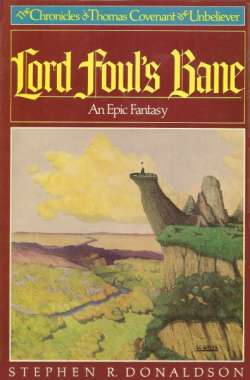 An illness that entirely gets to represents his only identity (left), and the truth of the impossibility of hope. In that condition he viscerally knows his harsh reality, and he knows that delusions come in the form of fantastic narratives. Fantasy landscapes where all illnesses can be healed, a natural world manifesting itself as pure beauty. With his feet in these two radically different and opposite worlds, he is lacerated. Torn from the inside. And he leashes out with pure anger because he’s painfully aware of how these delusions of hope and health are mocking his true condition. If you, the reader, go into the story, then it’s the fantasy world coming alive and being real. But if you instead take this story out and make it true, then you feel how powerful it is, and how much unsustainable pain it delivers.
An illness that entirely gets to represents his only identity (left), and the truth of the impossibility of hope. In that condition he viscerally knows his harsh reality, and he knows that delusions come in the form of fantastic narratives. Fantasy landscapes where all illnesses can be healed, a natural world manifesting itself as pure beauty. With his feet in these two radically different and opposite worlds, he is lacerated. Torn from the inside. And he leashes out with pure anger because he’s painfully aware of how these delusions of hope and health are mocking his true condition. If you, the reader, go into the story, then it’s the fantasy world coming alive and being real. But if you instead take this story out and make it true, then you feel how powerful it is, and how much unsustainable pain it delivers.
Reading the book I thought that TC reminded me of Felisin in Deadhouse Gates. Despite being completely different characters in different situations, they have in common the fact that when they appear in the story they are already broken. The point of no-return is reached and passed before you get to the first page. No redemption, no hope, no healing granted. They are both shattered characters whose pieces can only get broken further, hurting whoever comes close. Both filled with spite and anger, lashing out at everyone and everything, struggling to keep themselves away, secluded from the world. The most famous scene in this book is probably the controversial one some 80 pages into the book. The rape. For many readers this is the breaking point, where TC is fully recognizable as an unlikeable character that has none of the typical qualities and narratives that belong to the hero, or even the main character of a story. But through my different approach to the book that scene felt the most “truthful” and fitting. Plausible for what the character is and why. The way he behaves. TC had just made the transition to this fantasy world, went through a literal reawakening of the senses, previously deadened because of leprosy and lack of hope, that inward retreat. He viscerally knows that this consolatory narrative he’s dreaming about, this fantasy world, is a delusion. And so the promise of hope, of health, even of sexual attraction, all become a form of taunt to him. A torture borne by his brain. The rape is the moment TC loses control of himself and succumbs to instincts. In his perception he’s not being violent to another human being, as he firmly believes that he’s trapped in a hallucination. He’s lashing out with rage once again, this time by losing control of his desires. It becomes a pivotal scene because it strengthens TC “belief” that he’s no hero, and whenever he becomes the repository of hope he knows he’ll only corrupt it. He himself is the threat to the beauty of the land, its antithesis. Ill and broken in a world beautiful and whole. Hence the inward retreat that can upset some readers. TC doesn’t become a more likeable character through the novel as long you can’t connect with what he is and why.
He endures his journey through The Land as torture. He desperately clings to the only thing that makes sense to him, his illness. Think about hurtloam. It’s a type of loam that can be found naturally (the term isn’t even capitalized it’s so common) within the fantastic world that, rubbed on a wound, no matter how severe, can heal it overnight. Think about having it, the hope of curing all diseases right there in your hands. Then consider being consciously aware that it’s a delusion fed through a dream, that when you wake up you’ll know nothing of this exists. From THERE originates the pain, the unsustainable condition, that then turns in TC into rage and hate. And it is by facing those consolatory delusions and refusing them that you can live. Yet the more vehemently TC rejects all this, the stronger the Land impels him to commit by not giving him other choices (he can’t escape the dream in any way). It’s a siren’s song that persists even when refused, that TC is forced to listen, defenseless. It’s torture. A man forcefully thrust further down the pit of madness and pain.
He enters this world within, if we accept the thesis that he’s dreaming, through a transition that is clearly an inversion:
And now the background asserted itself, reached in and bore him down. Blackness radiated through the sunlight like a cold beam of night.
Maybe it’s because I come to this book with that strong bias I explained above, but the meaning of this inversion (black sunlight) appears to me very clearly as subconscious “taking over” consciousness. That blackness of thought that happens outside the light of awareness. Those lines precede TC entrance into the fantasy realm, and his dream. The inversion is about projecting the inward world, what he has within himself, outside. Make it Real.
Enter the Matrix.
The Land, a so generic name as if a placeholder for whatever fantasy realm a man could conceive, evoking an archetype, is made of a substance different than reality. The health of the environment and of the people is visible and tangible. TC notices how his senses adapt to these new perceptions and he’s able directly to feel nature around himself. At one point a giant he meets begins to sing, and this is how it is described:
A song with a wave-breaking, salty timbre like the taste of the sea.
Now, can you imagine how a “salty” timbre would sound like? Is TC on acid that he confuses one sense with the other? This happens so much, especially in natural descriptions, that it’s not a writing quirk, but very deliberate. I interpret it as a Matrix-like breach. Do you remember when in the movie the fabric of the matrix tears apart and shows itself for what it truly is? The columns of characters and numbers coming down, as the true fabric of that world revealed. This is the same. You see the inward/dreamworld working the way it does: through symbolic representations. Metaphoric in perception the way every dream is. Meaning-full, as every anthropomorphic world is.
At the very beginning of book 2 he’s back in the real world, and we have:
Futility is the defining characteristic of life.
Let’s make it “of reality”. But while he was still trapped in the dream, we have this:
He felt that he was the lodestone.
And, deliciously metalinguistic (the way I love it), the giant who sang above also proclaims:
“But you must understand, Unbeliever, that selecting a tale is usually a matter for deliberation.”
You can take it out of the story, and apply it to Donaldson, since this is the real deal. This is the story he selected, and that comes out, at least in part, of his deliberation. What does he want to tell us?
I think that an important part of its purpose lies in message that TC is given by a mysterious man before he enters The Land. And since I have not grasped the whole of it, I suspect that this theme will develop across the three books instead of just one. So I’ll have to wait. The message is a bit long, so I’ll quote just the relevant part:
The man refuses to believe that what he is told is true. He asserts that he is either dreaming or hallucinating, and declines to be put in the false position of fighting to the death where no “real” danger exists. He is implacable in his determination to disbelieve his apparent situation, and does not defend himself when he is attacked by the champion of the other world.
Question: is the man’s behaviour courageous or cowardly? This is the fundamental question of ethics.
As explicit as it gets.
That I was able to catch a so rich subtext filled with so many ideas is a testament to this book’s modernity. I was not only surprised to find this type of story in a book that is an old classic of fantasy, but also that Donaldson wrote this before his thirties. Ahead of his times in more ways than one. Every page is permeated with TC’s internal struggle, as well this anthropomorphic projection of The Land. It’s filled to the brim. Yet the weakness is in the straight plot, or classic fantasy narrative, if you take it out of the very specific context (like as I read it the first time I got the book many years ago). This appears as a very standard “quest”, that has the finding of a magical artifact as its goal, after going down into a black mountain. This plot, throughout the book, follows the trope as closely as possible. It’s obvious that on this level the book has none of the maturity of modern fantasy, and it is where it feels a bit dated. It’s formulaic and convoluted, not particularly exciting or surprising.
Quite the inverse of what one could expect. You come to a classic of fantasy thinking it would have a good adventure, but weak on subtext and themes. Instead I find an extraordinary work that plays competently with its big ideas, while it gets predictable and plain when leaning on the basic conventions of the genre. At the time the book sold a lot, and it was sold mostly as one of those clones in the trail of LotR, like The Sword of Shannara. I have no idea what all those readers thought when they read it, but it was still quite successful. I wonder if today I’m reading a different book, and if mine or theirs is the right one…
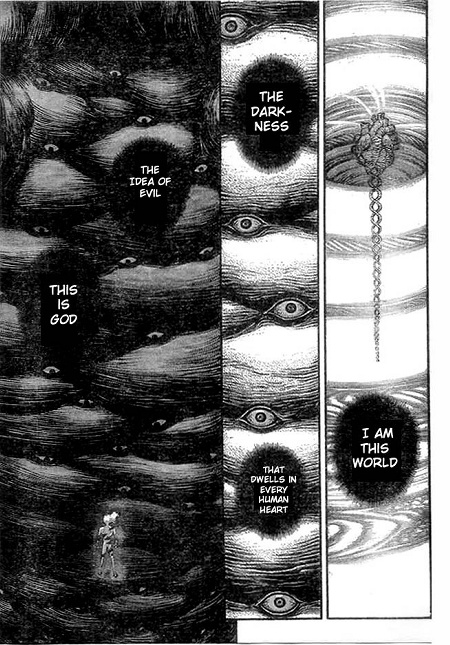


 An illness that entirely gets to represents his only identity (left), and the truth of the impossibility of hope. In that condition he viscerally knows his harsh reality, and he knows that delusions come in the form of fantastic narratives. Fantasy landscapes where all illnesses can be healed, a natural world manifesting itself as pure beauty. With his feet in these two radically different and opposite worlds, he is lacerated. Torn from the inside. And he leashes out with pure anger because he’s painfully aware of how these delusions of hope and health are mocking his true condition. If you, the reader, go into the story, then it’s the fantasy world coming alive and being real. But if you instead take this story out and make it true, then you feel how powerful it is, and how much unsustainable pain it delivers.
An illness that entirely gets to represents his only identity (left), and the truth of the impossibility of hope. In that condition he viscerally knows his harsh reality, and he knows that delusions come in the form of fantastic narratives. Fantasy landscapes where all illnesses can be healed, a natural world manifesting itself as pure beauty. With his feet in these two radically different and opposite worlds, he is lacerated. Torn from the inside. And he leashes out with pure anger because he’s painfully aware of how these delusions of hope and health are mocking his true condition. If you, the reader, go into the story, then it’s the fantasy world coming alive and being real. But if you instead take this story out and make it true, then you feel how powerful it is, and how much unsustainable pain it delivers.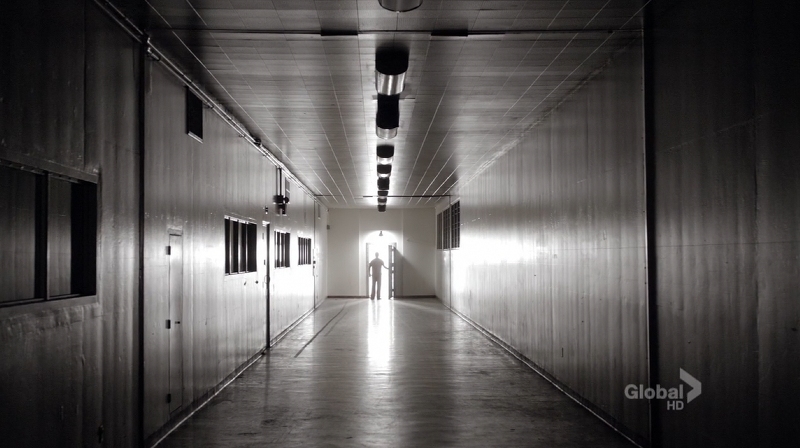
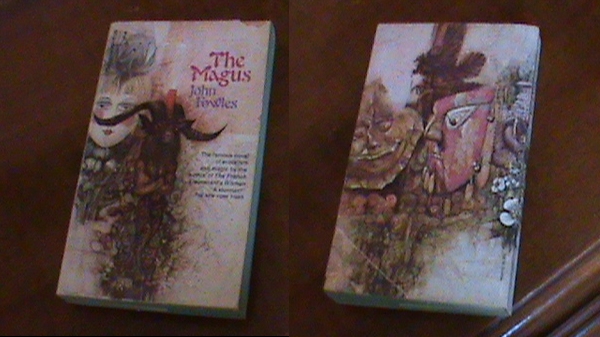
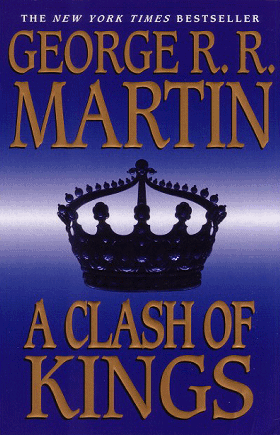 I’ve finished reading A Clash of Kings even if it didn’t show on my reading queue and I’m not going to “officially” review, but I wanted to write down some scattered comments about it and put some kind of content on the blog.
I’ve finished reading A Clash of Kings even if it didn’t show on my reading queue and I’m not going to “officially” review, but I wanted to write down some scattered comments about it and put some kind of content on the blog.